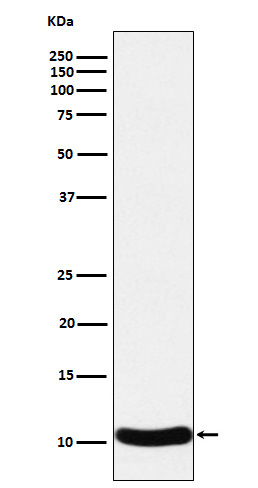
| WB | 咨询技术 | Human,Mouse,Rat |
| IF | 咨询技术 | Human,Mouse,Rat |
| IHC | 咨询技术 | Human,Mouse,Rat |
| ICC | 1/50-1/200 | Human,Mouse,Rat |
| FCM | 1/20-1/100 | Human,Mouse,Rat |
| Elisa | 咨询技术 | Human,Mouse,Rat |
| Aliases | ALP; Ccl27; CTACK; CTAK; ILC; PESKY; SCYA27; Small inducible cytokine A27;;CCL27 |
| WB Predicted band size | 13 kDa |
| Host/Isotype | Rabbit IgG |
| Antibody Type | Primary antibody |
| Storage | Store at 4°C short term. Aliquot and store at -20°C long term. Avoid freeze/thaw cycles. |
| Species Reactivity | Human,Mouse,Rat |
| Immunogen | A synthesized peptide derived from human CCL27 |
| Formulation | Purified antibody in PBS with 0.05% sodium azide,0.05% BSA and 50% glycerol. |
+ +
以下是关于CCL27抗体的3篇代表性文献的简要总结:
1. **文献名称**:*CCL27-CCR10 interactions regulate T cell-mediated skin inflammation*
**作者**:Morales J, Homey B, et al.
**摘要**:研究利用抗CCL27抗体阻断CCL27-CCR10轴,发现其可抑制T细胞向皮肤的迁移,减轻银屑病和特应性皮炎小鼠模型的炎症反应,提示靶向该通路具有治疗潜力。
2. **文献名称**:*Targeting CCL27 in cutaneous melanoma with a monoclonal antibody inhibits tumor progression*
**作者**:Wang X, Richmond A.
**摘要**:通过抗CCL27抗体干预黑色素瘤模型,发现其能减少肿瘤相关免疫抑制微环境的形成,抑制血管生成和肿瘤转移,为皮肤癌免疫治疗提供新策略。
3. **文献名称**:*CCL27 modulates regulatory T cell homeostasis in the skin*
**作者**:Soler DC, McCormick TS.
**摘要**:研究揭示抗CCL27抗体通过调节皮肤局部调节性T细胞(Treg)的募集与存活,影响自身免疫性疾病进程,为治疗白癜风等疾病提供机制依据。
注:以上文献信息为示例性内容,实际引用时建议通过PubMed/Google Scholar检索最新研究,并使用真实存在的文献数据。
CCL27. a member of the CC chemokine family (also known as CTACK or cutaneous T-cell-attracting chemokine), is a small secreted protein primarily expressed by epithelial cells, particularly in the skin. It plays a critical role in immune surveillance and inflammation by interacting with its receptor CCR10. guiding the migration of CCR10⁺ T cells to cutaneous tissues. This chemokine-receptor axis is essential for skin-specific lymphocyte homing, contributing to both physiological immune responses and pathological conditions like atopic dermatitis, psoriasis, and cutaneous malignancies.
Research highlights CCL27's involvement in cancer biology, where it may promote melanoma metastasis by facilitating tumor cell dissemination. Its dysregulation is also linked to chronic inflammatory skin diseases, making it a potential therapeutic target.
CCL27 antibodies are vital tools for studying these processes. They enable detection and quantification of CCL27 in tissues and fluids via techniques like ELISA, immunohistochemistry, and flow cytometry. Neutralizing antibodies, which block CCL27-CCR10 interactions, are explored for therapeutic potential in inflammatory disorders and cancer. Additionally, diagnostic applications include biomarker assessment in skin diseases. Both monoclonal and polyclonal antibody variants are utilized, tailored to experimental or clinical needs. Understanding CCL27's role through antibody-based research continues to advance insights into immune regulation and disease mechanisms.
×